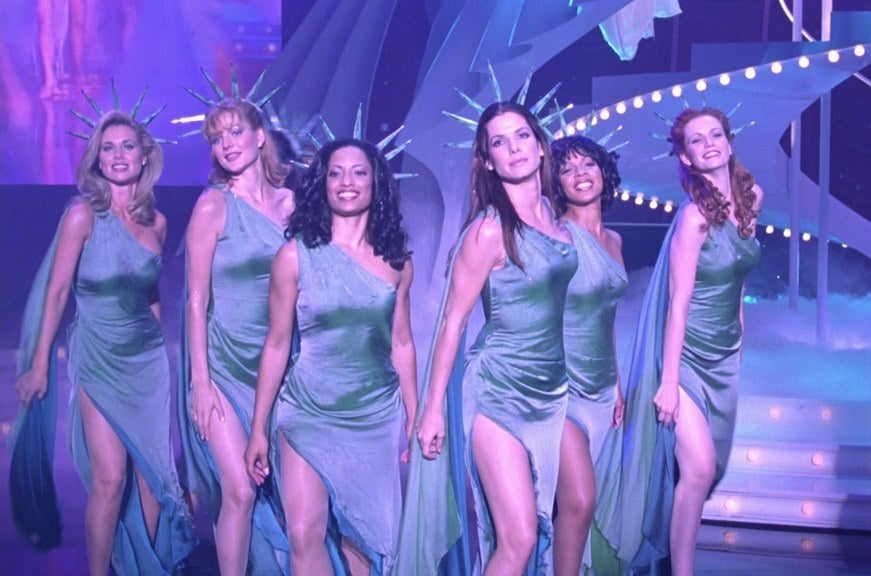In 2000, Miss Congeniality slipped under the radar. Falling just short of 5th highest grossing film of its opening weekend, it received a mere 42% rating on Rotten Tomatoes and a general consensus marked the film as altogether unexceptional. Miss Congeniality was decided to be “happily, deliberately second-rate, as if its ideal audience consisted of weary airline passengers”. These, of course, being some of the prime ingredients needed for cult status. Camp and glorious, Miss Congeniality’s cast of Sandra Bullock, William Shatner, Candice Bergen and Michael Caine render it beyond the ranking of any spoof or trash genre film. Every April 25th, the same clip of Heather Burns responding to the question of her perfect date with something plucked from a calendar rather than a romantic setting is shared. “My idea of a perfect date would be April 25th; it’s not too hot, not too cold, all you need is a light jacket.” There is something about this quote which sticks firmly in the consciousness. It is true that the comedy in the film is often slapstick and on-the-nose, that the dialogue surrounding body shaming is dated and the central plot FBI case is far-fetched. However, it is also true that there are definitely parts where this film strikes gold, particularly in its approach to female friendship and sexual assault, years before the #MeToo movement.
The film follows Grace “Gracie” Hart (Bullock), a floundering, but deftly intelligent FBI agent as she goes undercover at the prestigious Miss United States Beauty Pageant to investigate a bomb threat. The premise is a classic; place a professional, smart woman amongst beautiful bimbos and allow her to undercut them with humourous quips they can’t quite keep up with. It is a gross and unforgiving paradox where the smart woman can never be as beautiful as her opponents and the beautiful women simply are not able to unlock a certain level of intellect. This slandering approach lasts for most of the first act, concluding with a rather excellent make-over scene (“I’m in a dress, I’ve got gel in my hair, I haven’t slept all night, I’m starved and I’m armed. Don’t mess with me.”) There is a deliberate antagonisation of women; it is the women with intelligence who must reject all femininity to be taken seriously versus the airheads who do little else but groom and starve themselves because they do not know any better. Gracie’s undercover name ‘Gracie Lou Freebush’ is the equivalent of her “IQ dropping 10 points,” whilst the pageant director Cathy Morningside (Bergen) classifies “feminists, intellectuals; ugly women” in an exposing list of three. The set-up is there, but the film’s execution takes a turn from the traditional formula.
Whether it is a happy accident or the input of Katie Ford’s writing, as soon as Gracie meets her fellow Miss United States contestants, her internalised misogyny begins to unravel. Rhode Island’s Cheryl Frasier (Burns) takes her under her wing immediately in a misguided act of friendship. There is plenty of eye-rolling on Hart’s part but as the film progresses, her humour begins to take a turn, becoming less of a weapon and more a tool for mediation. She quashes an argument at the orientation breakfast with a joke, backtracks on making fun of baton-twirling upon learning it is Cheryl’s chosen ‘talent ’and laughs at her own tripping on-stage. The anger that Gracie holds onto is questioned as she reveals insecurities regarding her own likability, her need to be deemed as clever and her fear of messing up in her career. Hart’s objection to these women is less an attack on them but rather a feeling of insecurity that if she were to embrace femininity she would fail to be taken seriously in her place of work.
Beyond humour, Grace’s compassion also begins to show itself; she still guffaws at the “world peace” answer to every question but she also empathises with Cheryl when she gives her infamous “April 25th” answer. Gracie Lou Freebush is not real, but the wisdom and comfort she imparts to her fellow contestants is. She encourages Cheryl to step up and be brave in a way that is relatable (“first step pizza, next step flaming batons”) and when Cheryl confides in Gracie that she was attacked by a college professor, Hart’s instinct is to teach her friend how to protect herself. Much like in Netflix show Sex Education, sexual harassment here is the unifier of these women. This is a true turning point in the film, as Gracie feels a deep-seated responsibility not only to catch the bad guy but to help her friends.

This comes to head when an executive FBI decision is made to withdraw from monitoring the pageant. Here, Gracie voices her concern and instinct to stay put. If her fear was to not be taken seriously by her male colleagues, this scenario is her nightmare; criticised for following procedure, wearing a bathing suit and using idioms adopted from the other contestants. When the FBI depart the scene, Gracie resolutely stays behind, handing in her gun and badge without hesitation. In facing this fear of losing her job and with that, the only thing she uses to define herself, she is liberated. “I need to protect these girls,”she says. This act of friendship and understanding is unknowingly returned in the next scene. Gracie now has no help with the investigation. She also has no help with the decidedly more daunting task of a high beauty regime but her fellow contestants do and they help her willingly.
To gloss over Miss Congeniality’s faults would be short-sighted. There is gossip and a cattiness in the ranks, distasteful references to bulimia and ultimately an unrealistic standard of beauty is promoted (as if Sandra Bullock could ever be considered unfeminine). The male gaze dominates, monitoring how their female counterparts look and perform in a classic ‘boys being boys ’mantra. In the beginning of the film, Gracie is placed in an awkward limbo by those considered to be her friends. She is “one of the guys,” they call her ‘Einstein ’but cut across her, take credit for her work and limit her answering gender specific questions. When she questions if unfair treatment is due to her being a woman, she is met with the cutting “no-one thinks of you that way.” There is also obvious homophobia towards Caine’s character by the FBI agents, although this often played lightly to showcase the fragility of this kind of hyper-masculinity. Despite this, there are more redemptive factors. The film quickly and easily passes the Bechdel test. The director of the FBI is played by Ernie Hudson and the male lead is Benjamin Bratt who is of Latino descent. Out of the named and developed pageant contestants, there features two WOC, one of whom comes out as a lesbian over the course of the film. As far as the white-washed cinema of the early 2000s is considered, the film fares above average.
However, the most important scene in the film is arguably one which was well before its time. After complications regarding the performance of Hart’s ‘talent ’during the live show, she takes initiative and runs a short performative course on women’s self-defence. Throughout the film, Hart has been depicted as a clumsy character who jumps to conclusions. She is usually in the wrong place at the wrong time and more than a little dorky, symbolised in her distinctive snorting laugh. But here she is in the right, in her judgments as well as location. Standing proudly on-stage, Hart calmly and with authority teaches basic survival techniques for women, most notably a tactic known as ‘S.I.N.G. ’which looks to hit assailants in four vulnerable body parts; solar plexus, instep, nose, groin. She addresses something unspoken but universally understood: violence towards women.
The issue of violence towards women did experience some halfheartedly attempts at being addressed in sit-coms throughout the 1990s. A particular episode of Friends springs to mind where Ross, looking to outsmart Rachel and Phoebe, approaches their self-defence teacher for tips on how to attack women, the episode ending with him springing on two women he mistakes for his friends. The episode is painted in jest, focusing on the emasculation of Ross instead of the seriousness of why women would have interest in self-defence in the first place. On one hand, Miss Congeniality get laughs for this same reason; it is more embarrassing for a man that he is beaten up by a woman rather than remarkable that Gracie knows how to do so. From this lens of viewership, this scene showcases Grace Hart the misogynist; the woman who will criticise by commenting that someone is “fighting like a girl.”
However, looking at the development of her character, in Grace there is new confidence and ambition. The firm protection of her new friends is of paramount importance to her – beyond niceties. In the concluding fight scene, she breaks Mary-Jo Wright’s (Deidre Quinn) nose and rips the Miss United States crown from a bewildered Cheryl’s head to ultimately save both their lives. After solving the case and catching the culprit, Gracie still shows regard for the lessons she has learnt of etiquette and self-value. She is emancipated in her body, able to embrace it in a way which is not objectifying “the heels did something for my posture, and I’m suddenly very aware and proud of my breasts.”
Gracie’s winning of the pageant’s ‘Miss Congeniality’ award is the completion of her newfound feminism. Dubbed the funniest and nicest girl at the contest – a little irony is noted as the camera pans to Mary-Jo’s bandaged face – Gracie Lou Freebush’s value system is one which shifts from sneering at beautiful women simply because they are beautiful to regarding them as smart, capable and, most importantly, equal human beings. The concluding and tearful remark that she “really does want world peace” transforms her from an insecure woman of anger to an accepting, emotionally complex and successful individual. 20 years on, Miss Congeniality still manages to teach these lessons and it stands to say, “You go Gracie Lou!
Header image courtesy of Castle Rock Entertainment


Leave a comment